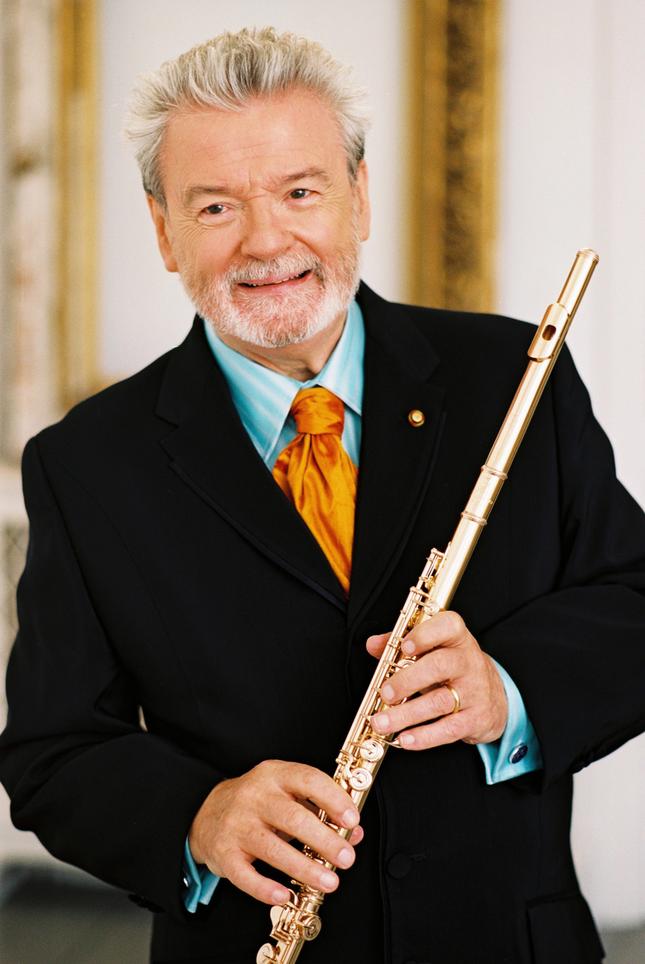Washington Performing Arts Presents Sir James (or Jimmy)
By • March 30, 2016 0 935

This week being the week of St. Patrick’s Day, it’s not hard to think of Sir James Galway in his Irish persona, because he most definitely is Irish, East Belfast-born and -raised. And he most definitely sounds Irish during the course of a brief phone interview, which manages to feel like a fine little slice of the life he leads.
Galway — Sir James, being a knight and all — has the natural lilt, the distinct vowels and a heartiness behind it, that identifies him as the Gaelic sort. To see him, and especially hear him, in person, well, there’s the afternoon concert at the Kennedy Center’s Concert Hall, Sunday at 4 p.m., part of the Washington Performing Arts season. (He will perform with his wife and fellow flutist Lady Jeanne Galway and pianist Phillip Moll.)
Since he is, after all, by most standards and reputation, the “world’s pre-eminent flutist,” you may also want to dial him up on YouTube. He is the man with the beard, now a little white and wizened; he is the “man with the golden flute”; he is the man who has made the flute and everything you can play on it hugely popular.
Like Jean-Pierre Rampal, only more so, Sir James has spread the gospel of the flute around the world. In his time, which is both then and now, he embodies the flute soloist as a superstar of music, both live and in concert, and captured on the millions of records that have been sold.
“Everyone in our family played something. Me, it was the flute, and I took to it not so much easily as naturally,” he told us in a previous interview. He has the gift of both gab and genius: he was for many years a member of the Berlin Philharmonic Orchestra, but then quit to take on a solo career — a risky proposition in some ways, but it made him who he is today.
“I saw — listening to jazz and pop and how some people played all that — what you might be able to do with the flute in that large arena,” he said. “And it’s not just about accessibility and popularity, it’s about teaching as well, because that’s a big and important part of what Jeanne and I do, when we do master classes or have people bring flutes to the concerts.”
Galway’s mainstreaming took the form of a quantum leap. You can see him on YouTube being interviewed, or playing with other kinds of stars (in one instance, playing the flute in Aspen with John Denver singing “Annie’s Song,” and in another, playing “Danny Boy” with full orchestra) and how perfect and natural that is. An album called “James Galway and the Chieftains in Ireland” from 1987 might be particularly worth listening to on this day.
“No question, it was like a large number of doors of possibility opened up,” he said.
He seems born to the flute. One observer said that Galway lives the flute, his last breath will be on the flute. Then again, it may be in mid-sentence, also, because he’s a talker.
“What we try to do with our program here, on tour, which we love, is to get the full depth and breath and range of what you can do with the flute,” he said.
To that end, there will be Phillipe Gaubert’s “Sonata No. 3 for Flute and Piano,” Franz Doppler’s lively “Rigoletto Fantasy for Two Flutes” (playing with Lady Galway, nee Jeanne Cinnante), Francois-Joseph Gossec’s “Tambourin,” Marin Marais’s “Le Basque,” the great violinist Fritz Kreisler’s “Schon Rosmarin” and Francois Borne’s “Carmen Fantasy,” among others.
Galway and his wife live in Switzerland by Lake Lucerne, but tour extensively. It’s a long way from the teeming streets of Belfast where he was born just before World War II.
And he’s a knight.
“Right,” he says. “It’s quite an honor, sure. It changes your life. It kicks you right out the working class, that’s for sure.
“Yeah, I know, what to call me. Sir James I guess is fine. But people like to call me Sir Jimmy, because to most people and myself, I was always a Jimmy.”
He is that, but more than that: a worldwide whirlwind carried by the echo of the flute — a golden flute for sure.

